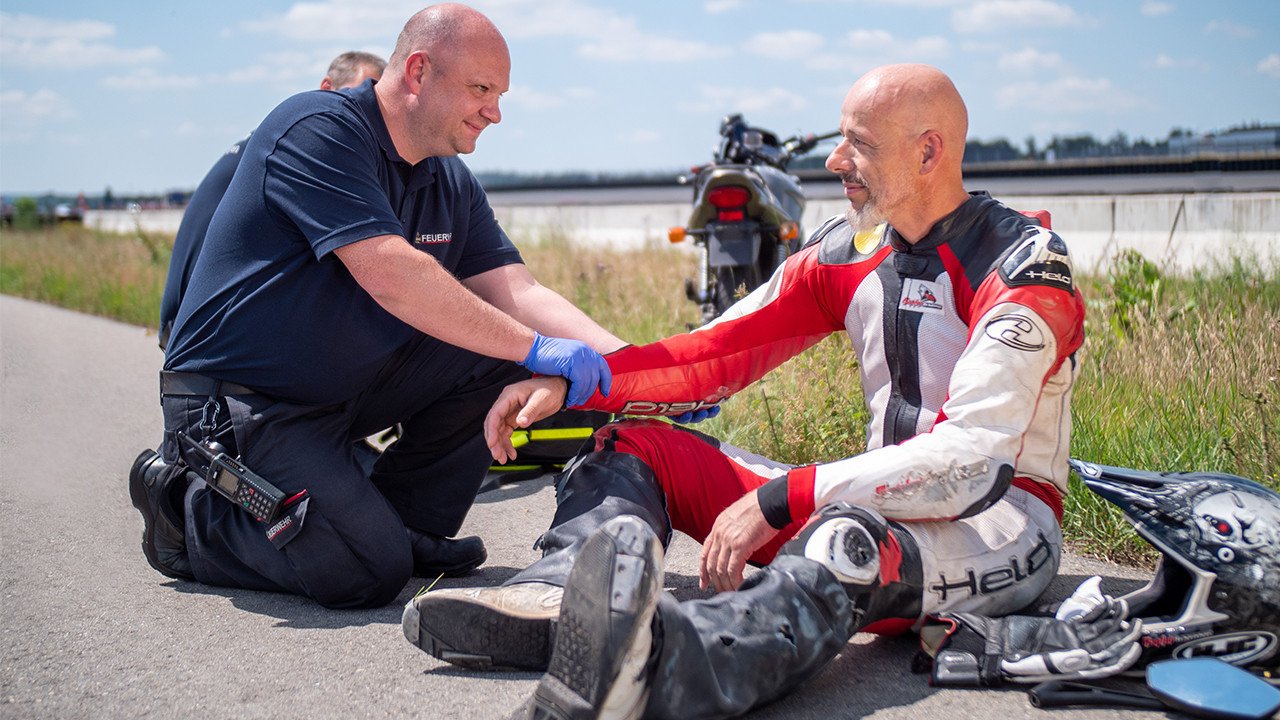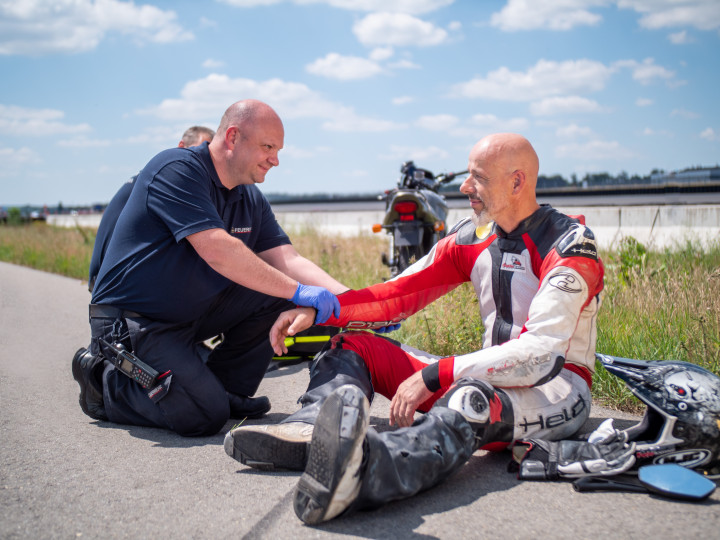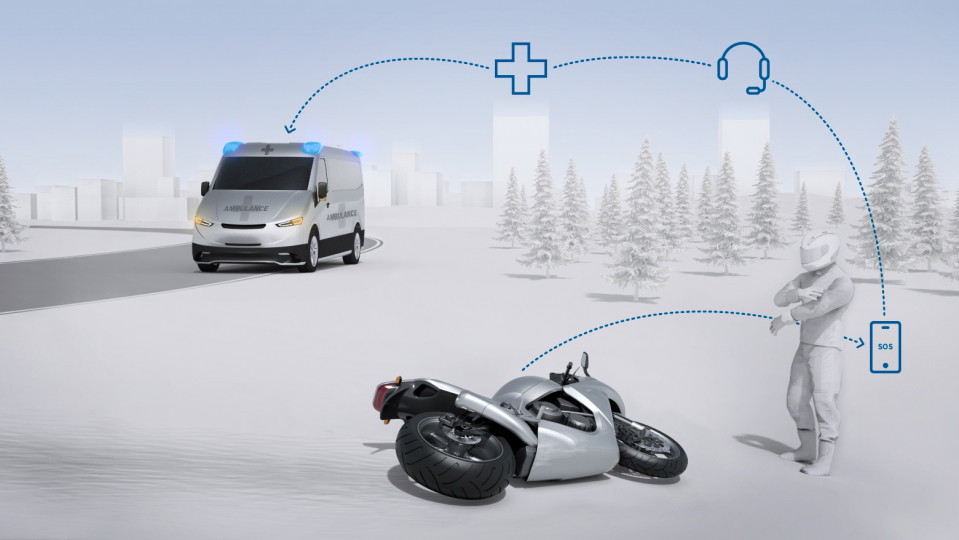Stuttgart, Germany – One careless moment is all it takes for someone to crash their e-bike or lose control of their motorcycle. In Germany alone, more than 38 two-wheelers are seriously injured in accidents every day (source: Federal Statistical Office). That’s when every second counts. But what if the person involved is traveling alone when the accident happens or if they are no longer in a position to call for help? This is where Bosch’s connected emergency call solution comes in. Help Connect accesses the sensors in the user’s smartphone and other connected devices and uses an intelligent crash algorithm to automatically detect accidents. In the event of an emergency, the app alerts the emergency services via the Help Connect emergency call center and immediately directs them to the scene of the accident.
This saves time, and potentially also lives. Two apps are now available for cyclists and motorcyclists and thus for several hundred thousand users: the COBI.Bike app from Bosch eBike Systems and the calimoto app for motorcycle navigation. “Bosch is working flat out to integrate its emergency call solution into other products, including those of partners. We are leveraging the internet of things and algorithms and using Help Connect to turn connected devices into personal lifesavers in all circumstances – whether on the road, during sports, or at home,” says Bosch CEO Dr. Volkmar Denner. Bosch currently provides the Help Connect service for users with a German SIM card in eleven European countries1.
One solution – triple benefit
Help Connect combines automatic accident detection, emergency call function, and personal emergency response system. In COBI.Bike and calimoto, for example, the crash algorithm evaluates smartphone sensor data about speed, acceleration, and rotation. Most of the smartphones commercially available today feature such sensors. The apps must be activated during the journey and the device must be attached to the handlebars. Help Connect works on all Android devices with version 6 or higher and all iOS smartphones with version 11 or higher.
In the event of an accident, the solution uses the smartphone’s mobile data connection to transmit the current location, the severity of the impact and, depending on the app, optionally stored health data to a Help Connect 24/7 emergency call center. From the call center, specially trained emergency agents attempt to make contact with the person involved in the accident. Communication takes place in German or English, even in other European countries. If the person does not react and the sensor data indicate a serious fall, the emergency services are notified immediately. Likewise, relatives and friends are optionally informed. An emergency call can also be triggered manually at any time.
For motorcyclists, Bosch has also developed an accident detection that is permanently installed in the vehicle. Here, Help Connect uses the inertial measurement unit integrated into the Bosch motorcycle stability control (MSC). Via Bluetooth, it connects to the corresponding partner app and then transmits the data to the Help Connect emergency call center, just as with the smartphone-based solution.
More partners – additional applications
Bosch wants to make life safer and is integrating its emergency call solution into as many connected products as possible – its own or those of partners. “Help Connect is designed as an open IoT ecosystem so that different products with appropriate sensor technology can become personal guardian angels,” Denner says. For example, the startup company Tocsen is currently integrating Help Connect into its crash helmet sensor solution. Bosch is also preparing its own smart home services and products to integrate into the Help Connect service. In addition to fire and burglar alarms, this will also include the topic of water protection in the home in the future.
1Apart from Germany, it is available in Austria, Belgium, France, Italy, Ireland, Luxembourg, the Netherlands, Spain, Switzerland, and the United Kingdom.
Additional information can be accessed at www.bosch-helpconnect.com
Mónika Hack
+36 70 510 5516
The Bosch Group is a leading global supplier of technology and services. It employs roughly 394,500 associates worldwide (as of December 31, 2020). According to preliminary figures, the company generated sales of 71.6 billion euros in 2020. Its operations are divided into four business sectors: Mobility Solutions, Industrial Technology, Consumer Goods, and Energy and Building Technology. As a leading IoT provider, Bosch offers innovative solutions for smart homes, Industry 4.0, and connected mobility. Bosch is pursuing a vision of mobility that is sustainable, safe, and exciting. It uses its expertise in sensor technology, software, and services, as well as its own IoT cloud, to offer its customers connected, cross-domain solutions from a single source. The Bosch Group’s strategic objective is to facilitate connected living with products and solutions that either contain artificial intelligence (AI) or have been developed or manufactured with its help. Bosch improves quality of life worldwide with products and services that are innovative and spark enthusiasm. In short, Bosch creates technology that is “Invented for life.” The Bosch Group comprises Robert Bosch GmbH and its roughly 440 subsidiary and regional companies in 60 countries. Including sales and service partners, Bosch’s global manufacturing, engineering, and sales network covers nearly every country in the world. The basis for the company’s future growth is its innovative strength. At 126 locations across the globe, Bosch employs some 73,000 associates in research and development, as well as roughly 30,000 software engineers.
The company was set up in Stuttgart in 1886 by Robert Bosch (1861-1942) as “Workshop for Precision Mechanics and Electrical Engineering.” The special ownership structure of Robert Bosch GmbH guarantees the entrepreneurial freedom of the Bosch Group, making it possible for the company to plan over the long term and to undertake significant upfront investments in the safeguarding of its future. Ninety-four percent of the share capital of Robert Bosch GmbH is held by Robert Bosch Stiftung GmbH, a charitable foundation. The remaining shares are held by the Bosch family, by a corporation owned by the family, and by Robert Bosch GmbH. The majority of voting rights are held by Robert Bosch Industrietreuhand KG, an industrial trust. The entrepreneurial ownership functions are carried out by the trust.
Additional information is available online at www.bosch.com, www.iot.bosch.com, www.bosch-press.com, www.twitter.com/BoschPresse





